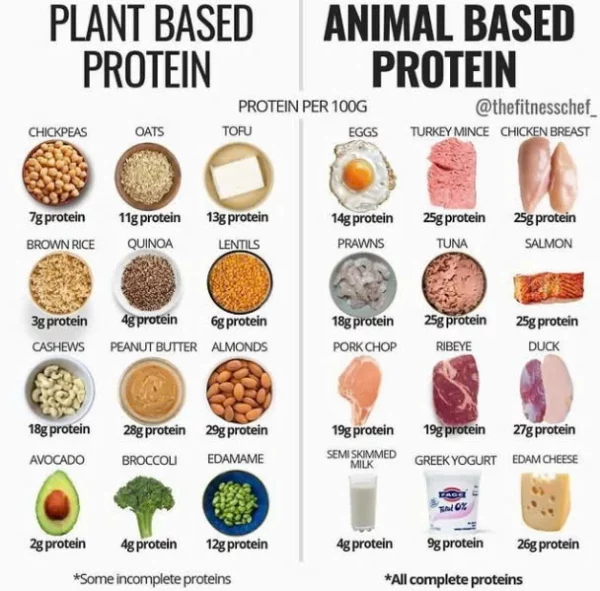The vegan diet, also known as veganism, has become a global trend with numerous promoted benefits, from weight loss to improved health and environmental protection. Entirely plant-based, this diet excludes all animal products such as meat, dairy, and eggs. But is it truly the ultimate solution for weight loss, or does it come with significant nutritional challenges?
According to a study by the American Dietetic Association published in 2016, a vegan diet can effectively support weight loss. On average, vegans lose 2-3 kilograms more than other dietary groups over six months. This is attributed to reduced saturated fat intake and increased fiber consumption from foods like vegetables, legumes, and whole grains. “A vegan diet not only aids in weight management but also offers long-term benefits for overall health.”

Comparison of fat and calorie content between vegan and animal-based foods
In addition to weight loss, this diet offers notable benefits in reducing the risk of chronic diseases. A 2015 study by the Harvard T.H. Chan School of Public Health found that plant-based diets lower the risk of heart disease, type 2 diabetes, and certain cancers. “Plant-rich foods are not only the key to health but also help maintain an ideal weight,” the report emphasized.
“A vegan diet is only effective if individuals make reasonable food choices, avoiding processed and sugar-laden products.” — Dr. Neal Barnard, Physicians Committee for Responsible Medicine
However, the vegan diet also comes with challenges. One of the main concerns is the risk of vitamin B-12 deficiency, as this nutrient is predominantly found in animal-based foods. Vegans need to supplement their diet through fortified foods or dietary supplements. Moreover, ensuring adequate protein, iron, calcium, and omega-3 intake is crucial. “Nutrient deficiencies can impair health if the diet is not carefully planned,” warned the World Health Organization (WHO).

A balanced vegan meal featuring vegetables, seeds, and whole grains
Another critical factor is the consumption of processed foods in a vegan diet. Products such as plant-based meat substitutes or vegan sweets often contain high amounts of calories and sugar, which can lead to weight gain instead of weight loss. According to the Academy of Nutrition and Dietetics, “An ideal vegan diet focuses on whole foods while minimizing processed items.”
In conclusion, the vegan diet can be an effective weight loss strategy when properly implemented. However, to ensure long-term health, individuals should focus on nutritional balance, avoid processed foods, and supplement essential micronutrients.


HPX24h > Healthy Eating > Vegan Diet: An Effective Weight Loss Solution or a Nutritional Challenge?
Top Reads from This Category
Healthy Eating
Why Do We Crave Sweets? A Scientific Perspective on Food Cravings
Healthy Eating
How Many Calories Do You Need Each Day to Maintain Optimal Health?
Healthy Eating
Longevity Diet: The Key to Nutrition That Helps Extend Lifespan
Healthy Eating
MIND Diet – The Secret to Protecting the Brain and Preventing Cognitive Decline
Healthy Eating
Vegan Keto Diet: Everything You Need To Know
Healthy Eating
Health is ‘Declining’ Due to Processed Foods: How to Turn the Tide
Healthy Eating
Gallbladder Protection Through Diet: Expert Guide and Practical Tips
Discover New Topics
Fitness
Effective Training Tips to Enhance Muscular Endurance
Healthy Eating
The Comprehensive Guide to the 16:8 Intermittent Fasting Diet
Fitness
The Secret to Holistic Health: Aerobics and Its Role in Preventing Cardiovascular Disease
Animals
The Way African Ants Use Venom to Paralyze Prey from a Distance
Fitness
Cardiovascular Endurance: The Key to Optimizing Overall Health
Fitness
Muscle Strain During Exercise: Effective Prevention and Recovery Tips
Space
Jupiter-Like Planets: The Key to Unlocking Earth-Like Worlds
Health
Forgetfulness Can Bring Unexpected Evolutionary Benefits
Animals
Unexpected Science: When Seismologists Listen to Underwater Earthquakes and Discover Whale Songs
Science
Cow-Free Milk: The Food Revolution Shaping Our Future
Health
Daily Habits to Naturally Manage Blood Pressure Without Medication
Fitness
More Flexible – The Secret to Longevity?
Science
Science Uncovers the Brain’s Process of Storing New Ideas